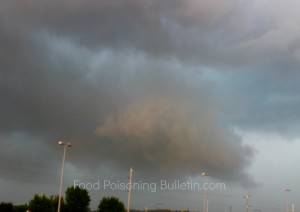The USDA is offering food safety tips for consumers in the path of Tropical Storm Isaac. The storm will most likely be upgraded to a hurricane before it hits the Florida Keys and Tampa Bay area. Power outages and flooding can compromise the safety of stored food. And consumers should plan ahead to have food and water on hand that is safe to eat.
 USDA Under Secretary for Food Safety Dr. Elisabeth Hagen said, “storing perishable food at proper temperatures is crucial to food safety but can become difficult if you lose electricity for your refrigerator and freezer. For those living in Tropical Storm Isaac’s projected path, we recommend stocking up on canned food [Ed. note: make sure you have a can opener!], bottled water, batteries, and dry ice.”
USDA Under Secretary for Food Safety Dr. Elisabeth Hagen said, “storing perishable food at proper temperatures is crucial to food safety but can become difficult if you lose electricity for your refrigerator and freezer. For those living in Tropical Storm Isaac’s projected path, we recommend stocking up on canned food [Ed. note: make sure you have a can opener!], bottled water, batteries, and dry ice.”
The government has compiled a fact sheet called “A Consumer’s Guide to Food Safety: Severe Storms and Hurricanes.” Print and keep that in a safe place for reference.
There are a number of tips and rules that can help you stay safe during and after the storm. Keep an appliance thermometer in the fridge and freezer, but don’t open them often during a power outage to conserve the temperature. Keep food on shelves that will be out of the way of possible flooding.
Freeze leftovers, fresh meat, and poultry to help them stay safe longer. During a power outage, a full freezer will keep its safe temperature for 48 hours if full, 24 hours if half-full, while a fridge will stay cold for only 4 hours, and only if the door is closed. You can use dry ice to keep the fridge cool; 50 pounds should keep a stocked 18-cubic-feet freezer cold for two days. Have coolers on hand to keep perishables cold if the power is out longer than four hours and you don’t have dry ice on hand.
After the storm, check the fridge and freezer temperatures. For frozen food, if the food still has ice crystals, it can be refrozen. Discard perishable foods that have been out of refrigeration or above 40 degrees F for two hours. Discard foods not in a waterproof container if it has come into contact with flood water. Discard wooden cutting boards, plastic utensils, baby bottle nipples, and pacifiers if they touch flood water. And sanitize anything else, such as metal pans that have been in contact with flood water by boiling them or immersing them in a bleach solution.
Finally, never taste food to determine if it’s safe. When in doubt, throw it out! And stay tuned to news channels and listen to government authorities for the latest information.




